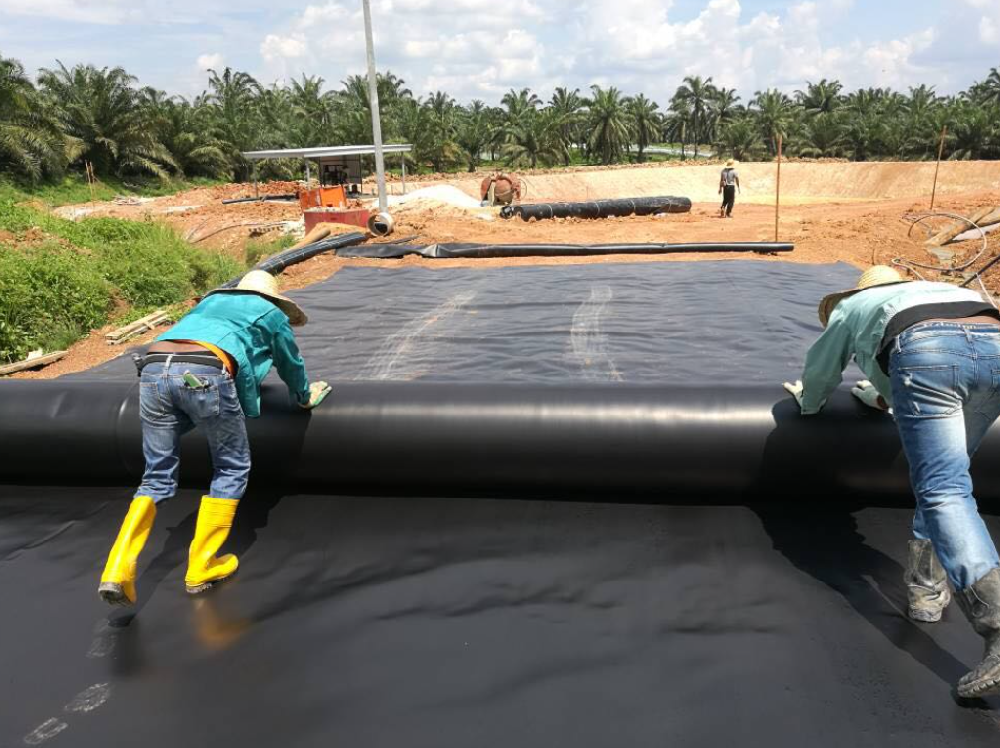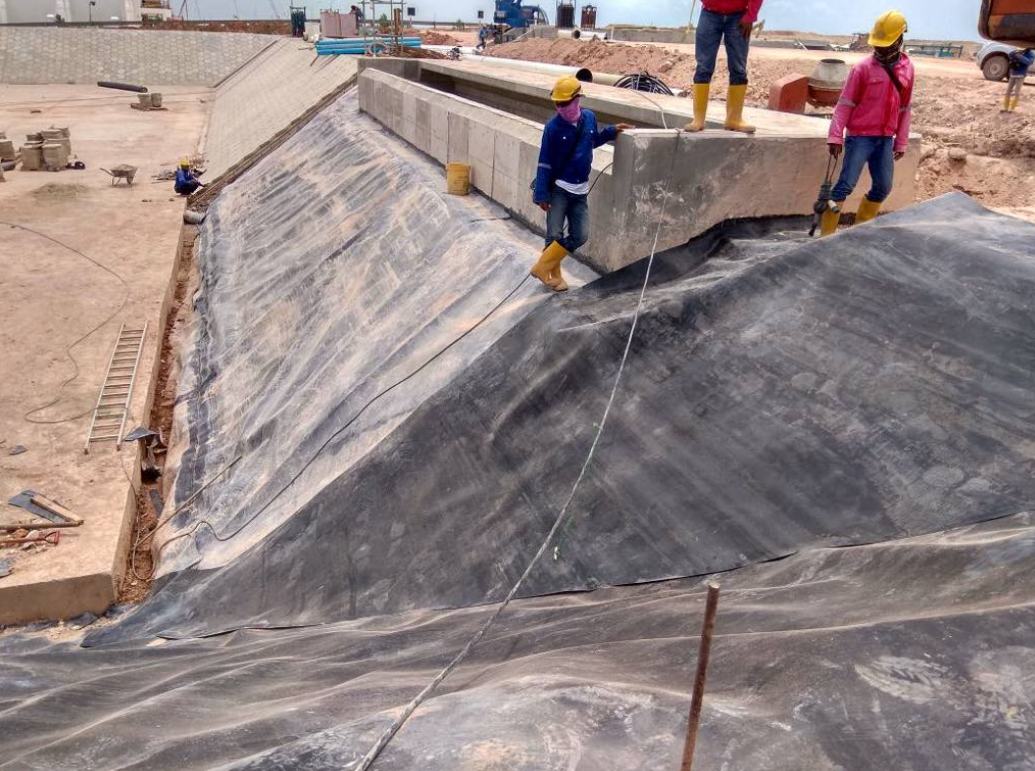- Understanding the Role of Geomembrane Liners in Waste Management
- Innovations in Geomembrane Liners for Water Management
- Geomembrane Liners: A Comprehensive Guide
- The Future of Geomembrane Liners in Civil Engineering
- Geomembrane Liners: Enhancing Landfill Stability
Manager:Alvin Wang
WhatsApp:+62 8983806051
Tel:+86 10-5797-1075
Email:steelwang@okorder.com
Address:3rd Floor, No.2 Building, No.1 Sanlihe Road
Why is HDPE geomembrane better than PVC?
When it comes to choosing the appropriate geomembrane material for engineering and environmental projects, the choice of material plays a very crucial role in determining long-term performance as well as reliability. There are two common types of geomembranes that include High-Density Polyethylene (HDPE ) geomembranes and Polyvinyl Chloride (PVC) geomembranes, each having its own set of pros and cons. In this article we will elucidate why many applications opt for HDPE rather than PVC.

1 Durability And Strength
The key reason why hdpe Geomembrane is mostly preferred over pvc geomembrane is because it is more resistant to wear and tear. HDPE geomembrane has exceptional tensile strength, puncture resistance as well as toughness making them suitable for use in demanding engineering and environmental applications. The molecular The structure of the high density polyethylene geosynthetics (HDPE) has a highly oriented molecular structure with strong intermolecular bonding which provides excellent mechanical properties and dimensional stability.
Conversely, PVC-based geomembranes may have a lower tensile strength compared with those made from HDPE. Although they are generally more flexible and conformable than HDPEs, unlike the latter ones these may be torn or punctured under excessive loads or by sharp objects. In many cases where strength and durability are critical considerations, HDPE geosynthetics of choice.
2 Chemical Resistance
In comparison with PVC geosynthetics, HDPE geosynthetics have better chemical resistance properties hence are more ideal for situations involving exposure to corrosive chemicals. Inherent chemical resistance defines HDPE's ability to withstand acids, alkalis solvents and hydrocarbons among other forms of chemical attacks [19]. In Despite of harsh conditions such materials do not undergo any deterioration or loss in mechanical functionality due to their unique blend containing high levels if cross linking.
In contrast, PVC geomembranes may undergo chemical degradation under certain conditions. Prolonged exposure to aggressive chemicals can lead to molecular structure weakening in PVC geomembranes, which causes embrittlement, cracking and loss of impermeability. The use of HDPE is preferred in cases involving containment of hazardous substances or chemical storage owing to its superior resistance to most chemicals.
3 UV Stability
HDPE geomembrane has relatively higher UV stability compared with PVC geosynthetics hence stands better chances of staying longer under sunlight influence without degrading. Sunlight UV radiation destroys the molecular bonds within a geomembrane material leading to long-term surface oxidation and eventual mechanical property losses through embrittlement. This protection is usually provided for by incorporating UV stabilizers or additives into HDPE geomembrane formulations so as to ensure their long life when used outdoors.
Contrarily, it is possible that PVC geosynthetics may degrade more from UV radiation especially when used in regions receiving high amounts of sunlight. Inadequate protection against ultraviolet light causes brittleness and cracks on the surface of unexposed materials thereby compromising their integrity and permeability. For instance, HDPE geomembranes are often preferred as landfill liners, pond liners, and reservoir covers for outdoor applications due to their improved sun tolerance.
4 Environmental Impact
Comparatively speaking about the environmental impact between HDPE and PVC geosynthetics will help us know which one is better than the other one concerning this factor since they have varying contributions towards environmental pollution issues. If anything comes next after choosing environmentally friendly alternatives then you should never ignore recycling or reusing these materials if you are not sure about them because their constructions should be done from thermoplastic polymers like High-Density Polyethylene (HDPE) which can be recycled back into various forms- an initiative that conserves natural resources while reducing waste produced here.
However, PVC is a synthetic polymer of plastic which can be harmful to environment during its manufacturing process, application, and disposal. PVC production involves chlorine and other dangerous substances while its lifecycle releases toxic substances like phthalates and dioxins into the surroundings through their products. Nonetheless, the reusability of PVC geomembranes may result in less environmental impact as compared to HDPE ones.
5 Cost considerations
The cost factor is critical because although HDPE geomembrane may have a number of advantages over PVC geomembrane like durability, chemical resistance, UV stability and environmental effects. In order to make them thicker for example in construction of HDPE geomembranes that results in increased costs during manufacturing process when compared to PVC geomembranes. Nevertheless, factors such as material thicknesses used in making this product; how complex the installation is as well as what are unique requirements or need for these materials will determine the total costs for any given liner system.
In some cases however, durability, chemical resistance and UV stability are long-term benefits of HDPE geomembrane that may exceed initial cost difference by comparison with PVC geomembrane. Thus engineers and project managers when choosing liners should compare life-cycle costing (LCC) and performance between HDPE geomembrane versus PVC.

6 Conclusion
HDPE geomembrane possesses several advantages over the PVC variant regarding durability, tensile strength, chemical resistance capability, UV stability property as well ecological impacts. These membranes made from high density polymers also exhibit remarkable mechanical properties that render them suitable for tough engineering and environmental applications. Furthermore they have excellent endurance against chemicals and resisting UV rays even under harsh conditions plus they are recyclable; thus being environmentally favoring than others.
On the other hand long-term performance including performance vis-à-vis environmental impact versus first cost difference(s) necessitates higher initial investment for many instances where society demands better quality service provision from those who have expertise to do so. side, understanding why HDPE geomembrane is better than PVC helps project managers and engineers to opt for the right lining natals for their own uses.
- Previous:Is HDPE geomembrane the same as PEX?
- Next:What is the most widely used HDPE geomembrane in current use?
-
2024-12-05Geomembrane Liners: A Comprehensive Guide






